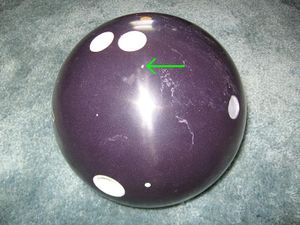Difference between revisions of "Center of Gravity"
Jump to navigation
Jump to search
| Line 1: | Line 1: | ||
{{Caution|Please keep this page as '''objective''' as possible, keep debates and subjective comments on the discussion page}}<br /> | {{Caution|Please keep this page as '''objective''' as possible, keep debates and subjective comments on the discussion page}}<br /> | ||
[[Image:cgpunch.jpg|thumb|right|CG punch on a bowling ball]] | [[Image:cgpunch.jpg|thumb|right|CG punch on a bowling ball]] | ||
| + | |||
==Definition== | ==Definition== | ||
Revision as of 19:35, 4 August 2007
Contents
Definition
Definition 1: The point marked on the cover of the ball, indicating where the most top weight is, to be used in the drilling process
Definition 2: The actual center of gravity close to the center of the ball
In myths, it has been claimed to affect ball reaction enough to be important to consider when laying out a ball
Does CG Matter?
It's been an ongoing debate on internet message boards such as BallReviews.com to determine whether CG matters or not. Both sides, "CG Matters" and "CGNOMADDAH" have each come up with an argument each stating CG's effect on ball reaction. Below is a recap of each side's point(s).
"CG Matters" View
"CGNOMADDAH" View
- 1 Ounce of static weight accounts for 1/256th of the entire weight of a 16 pound bowling ball.
- Shifting CG does NOT modify the orientation of the core.
- Shifting CG does NOT modify track flare OR move the bowtie.
- The effect of CG on ball reaction is less than the effect of bowler error, or the inability to repeat shots.
- Brunswick Video Lane Plot shows no difference in ball reaction.
